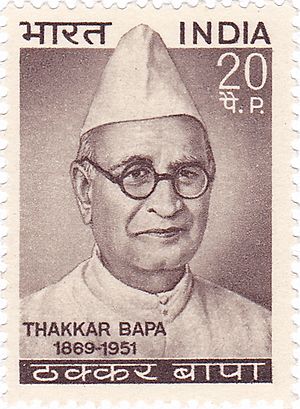Thakkar Bapa facts for kids
Quick facts for kids
Thakkar Bapa
|
|
|---|---|
 |
|
| Born |
Amritlal Vithaldas Thakkar
29 November 1869 Bhavnagar, Bombay Presidency, British India
|
| Died | 20 January 1951 (aged 81) |
| Nationality | Indian |
| Education | L.C.E. (Licenciate in Civil Engineering, presently equivalent to Graduate in Civil Engineering) |
| Occupation | Social worker |
Amritlal Vithaldas Thakkar, known to many as Thakkar Bapa (born November 29, 1869 – died January 20, 1951), was a very important social worker in India. He spent his life helping tribal people and others who faced unfair treatment. He focused especially on people in what is now the Gujarat state.
Thakkar Bapa joined the Servants of India Society in 1914. This group was started by Gopal Krishna Gokhale in 1905. In 1922, Thakkar Bapa started his own group called the Bhil Seva Mandal.
Later, he became the general secretary of the Harijan Sevak Sangh. This organization was founded by Mahatma Gandhi in 1932. Thakkar Bapa also helped start the Bharatiya Adimjati Sevak Sangh on October 24, 1948.
Mahatma Gandhi called him 'bapa', which means 'father'. In 1939, Mahatma Gandhi even called him "Father of Harijans." Thakkar Bapa traveled to many remote parts of India. He studied the lives of tribal people and Harijans. He worked to improve their situations.
Early Life and His Mission
Thakkar Bapa was born on November 29, 1869. His family lived in Bhavnagar, in the Saurashtra region of Gujarat, India. He finished high school in Bhavnagar in 1886.
His father, Vithal Das Thakkar, taught him about kindness and helping others. In 1890, he earned his engineering degree from Poona Engineering College. He worked as an engineer in Porbander.
Later, he even worked in East Africa, helping to build the first railway track in Uganda. He also served as a chief engineer in Sangli State. Then, he worked for the Bombay municipality as an engineer.
While working in Bombay, he saw how difficult life was for people who cleaned the city. He saw the poor living conditions of these workers. This experience made him decide to dedicate his life to helping these people.
In 1914, he left his engineering job to become a full-time social worker. He joined the Servants of India Society. He spoke up for the rights of tribal people and those considered "untouchable." In the 1930s, he created the word adivasi to describe tribal people, who were the original inhabitants of the forests.
Thakkar Bapa spent 35 years of his life working for the empowerment of Harijans. He traveled to many places, including forests in Assam, rural Bengal, and drought-hit areas of Orissa. He also visited tribal areas in Gujarat and Harijan areas in Saurashtra. He went to Mahar areas in Maharashtra, and hilly areas of Chhota Nagpur. He even visited the desert of Tharparkar and the foothills of the Himalayas.
Honors and Recognition
The Government of India honored Thakkar Bapa by issuing a postage stamp with his picture in 1969. A well-known area in Mumbai, called Bappa Colony, is named after him.
The Madhya Pradesh state government has an award named after him. This award recognizes people who provide dedicated services to poor and tribal communities. The Maharashtra government also has a plan to improve tribal villages and colonies. This plan, started in 2007, is called Thakkar Bappa aadivasi vasti sudharana.
Popular Culture
In Tamil Nadu, Thakkar Bapa was lovingly known as "Appa Thakkar." This is the Tamil version of his popular name. People noticed he was very knowledgeable and could answer questions quickly. Because of this, a term in Madras Bashai (a local dialect) developed: "appatakkar." It means someone who knows everything. This term became popular after being used in the 2010 Tamil film Boss Engira Bhaskaran.

